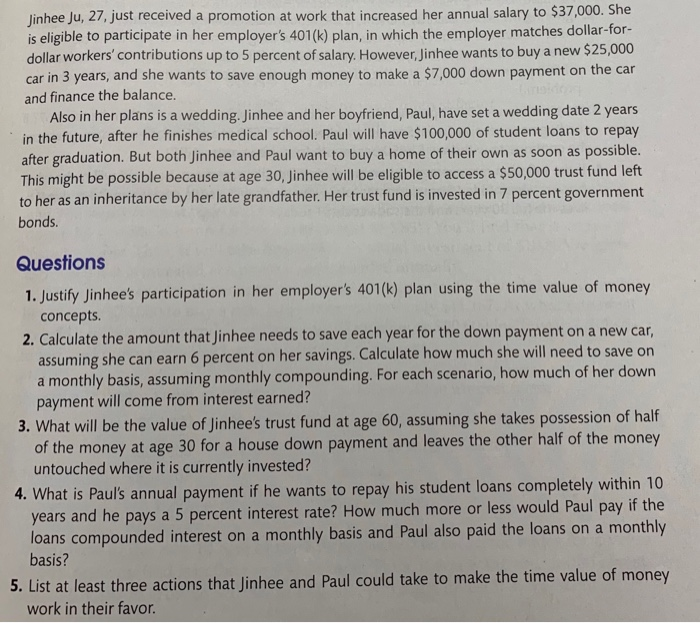Jinhee Ju, 27, just received a promotion at work that increased her annual salary to $37,000. She is eligible to participate in her employer's 401(k) plan, in which the employer matches dollar-for- dollar workers' contributions up to 5 percent of salary. However, Jinhee wants to buy a new $25,000 car in 3 years, and she wants to save enough money to make a $7,000 down payment on the car and finance the balance. Also in her plans is a wedding. Jinhee and her boyfriend, Paul, have set a wedding date 2 years in the future, after he finishes medical school. Paul will have $100,000 of student loans to repay after graduation. But both Jinhee and Paul want to buy a home of their own as soon as possible. This might be possible because at age 30, Jinhee will be eligible to access a $50,000 trust fund left to her as an inheritance by her late grandfather. Her trust fund is invested in 7 percent government bonds. Questions 1. Justify Jinhee's participation in her employer's 401(k) plan using the time value of money concepts. 2. Calculate the amount that Jinhee needs to save each year for the down payment on a new car, assuming she can earn 6 percent on her savings. Calculate how much she will need to save on a monthly basis, assuming monthly compounding. For each scenario, how much of her down payment will come from interest earned? 3. What will be the value of Jinhee's trust fund at age 60, assuming she takes possession of half of the money at age 30 for a house down payment and leaves the other half of the money untouched where it is currently invested? 4. What is Paul's annual payment if he wants to repay his student loans completely within 10 years and he pays a 5 percent interest rate? How much more or less would Paul pay if the loans compounded interest on a monthly basis and Paul also paid the loans on a monthly basis? 5. List at least three actions that Jinhee and Paul could take to make the time value of money work in their favor. Jinhee Ju, 27, just received a promotion at work that increased her annual salary to $37,000. She is eligible to participate in her employer's 401(k) plan, in which the employer matches dollar-for- dollar workers' contributions up to 5 percent of salary. However, Jinhee wants to buy a new $25,000 car in 3 years, and she wants to save enough money to make a $7,000 down payment on the car and finance the balance. Also in her plans is a wedding. Jinhee and her boyfriend, Paul, have set a wedding date 2 years in the future, after he finishes medical school. Paul will have $100,000 of student loans to repay after graduation. But both Jinhee and Paul want to buy a home of their own as soon as possible. This might be possible because at age 30, Jinhee will be eligible to access a $50,000 trust fund left to her as an inheritance by her late grandfather. Her trust fund is invested in 7 percent government bonds. Questions 1. Justify Jinhee's participation in her employer's 401(k) plan using the time value of money concepts. 2. Calculate the amount that Jinhee needs to save each year for the down payment on a new car, assuming she can earn 6 percent on her savings. Calculate how much she will need to save on a monthly basis, assuming monthly compounding. For each scenario, how much of her down payment will come from interest earned? 3. What will be the value of Jinhee's trust fund at age 60, assuming she takes possession of half of the money at age 30 for a house down payment and leaves the other half of the money untouched where it is currently invested? 4. What is Paul's annual payment if he wants to repay his student loans completely within 10 years and he pays a 5 percent interest rate? How much more or less would Paul pay if the loans compounded interest on a monthly basis and Paul also paid the loans on a monthly basis? 5. List at least three actions that Jinhee and Paul could take to make the time value of money work in their favor







